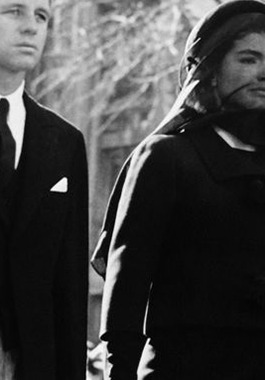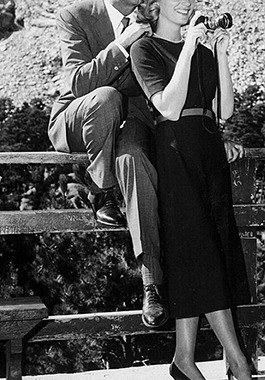#as is the veil photo lmaoooo
Photo


BEYOND THE WIDOW’S WEEDS: AN INTERVIEW
by Violet Whittaker for PRIMA Magazine (photographs supplied by Riza Mustang)
“I don’t like to hear that I was poised, or maintained a good appearance for the cameras. I am not a movie actress.” On the fifth anniversary of Führer Mustang’s assassination, Violet Whittaker sits down with his widow, Riza Mustang, and listens to her open up about her husband, the horrifying moments leading up to his death, and what the country meant to him.
CENTRAL EVENING TIMES
MUSTANG SHOT DEAD
Gunned Down During Campaigning In Eastern District
FÜHRER PRESIDENT MUSTANG was assassinated today. The President was shot as he gave a speech at the recently completed Amestris-Xing Railroad Hub. The Governor of East District was also badly wounded, as well as a number of diplomats representing the Empire of Xing. The President died at 3.07pm. After a burst of gunfire that cut down the President, he was rushed to Eastern General Hospital, where emergency blood transfusions were given. He was 47, and was in the final stages of an incredibly popular re-election campaign that likely would have seen him take on a third fifth-year term. He is survived by his wife, Riza Mustang, who was also in attendance today. Preliminary reports suggest she was also injured, but these are unconfirmed as of printing.
On December 3rd, 1932, four days after becoming the country’s most famous widow, Riza Mustang slipped on a mourning veil. The delicate shroud reached beyond her waist, and it moved lightly in the cool winter wind as she followed her husband’s coffin in the cortege that travelled from the official residency of the Führer President to the Philip Andersen Military Cemetery. The veil was sheer enough to reveal her pale, drawn face – though not completely. The widow of Roy Mustang, just as much as she was during his tenure, ensured she was both visible and protected from the public eye.
“I don’t like to hear that I was poised, or maintained a good appearance for the cameras,” she says now, five years later, on a similar, windy December 3rd. “I am not a movie actress. I never have been.”
Although largely withdrawn from the public eye since his assassination, Riza Mustang has not been resting on her laurels. She is heavily invested in projects that focus on economic development in deprived areas of Amestris, as well as increasing the capacity and reach of educational programs for young women. Those who she works with on a daily basis agree with the assessment that Riza Mustang is a hard worker; albeit one who shies away from taking credit, preferring to uplift others over herself.
“People always tell me that he would be proud of me, for the work that I do.” A strained kind of smile graces her face. “There’s no doubt that he would be. It’s just quite funny how people assume to have known my husband better than myself.”
Whether she intended to or not, Riza Mustang’s actions and presentation of herself to the public in the minutes, hours, and days after her husband’s assassination is embedded in the cultural zeitgeist of Amestris, arguably just as much as her husband’s impact on the country. Her quick thinking, reflexes, and experience as the Führer’s primary bodyguard, ensured that the assassin had only moments at best to flee the scene – something they were unable to achieve. Lucas Alexander, a 23-year-old university student with ties to Aerugean intelligence, was apprehended only 11 minutes after the first shot rang out. As Riza was performing CPR on her husband, she was also instructing his service team about the trajectory of the bullets, spray pattern, and likely points of origin. While there have been many enduring images of the two during Mustang’s tenure as leader of the nation, none will ever surpass the visceral impact of her covered in blood, attempting to revive her husband and simultaneously protect him from further harm. The country was torn in two at the violent exhibition in the evening newspapers, but sources close to Riza claimed the embargo on those photos was dropped deliberately at her command. She was quoted as saying “I want them to see what they did.”
I don’t ask Riza who ‘they’ are – widely understood to be the loudest of Mustang’s political detractors, whose divisive rhetoric was thought to directly embolden the attack in the first place. I don’t ask her whether the quote is true or not, or whether she regrets not being officially assigned as her husband’s primary bodyguard for that day.

Instead, Riza explains her frustration that such a large proportion of the attention surrounding her husband’s assassination was rooted in her actions and image, rather than what she believes to be more important. “It was like people wanted to forget the fact that these attitudes – particularly around the projects being implemented in the East – were not coming out of a vacuum. My husband was famously vocal in his defence of all Amestrian’s, regardless of race or creed. To see his name and legacy become entwined with a political circus that serves to undermine his achievements rather than honour them is disgraceful. It should not have mattered that I tried to save his life on that stage. It should not have mattered that I looked ‘the part’ as I watched them bury him in the earth. Roy was the sum of his parts; not mine.”
Although she had come to expect – and anticipate – attempts on her husband’s life, not only for what he personally represented, but for what his station represented as well, Riza agrees that Amestris has a fraught relationship with its leaders. “I don’t think it’s lost on many people that we’ve lost two of the last four leaders by successful assassinations. Roy wanted to address the crevasses in this country that we collectively have gotten very good at ignoring. Establishing the railroad formally with Xing was a decade’s worth of bilateral work, proving not only to our neighbours – but to ourselves as well – that we could forge bonds with one another, rather than break them.”
Her disaffected outlook is perhaps why she has pulled back from the public eye – not that, she admits, she ever enjoyed being there in the first place.
“I don’t have the patience for politics – for people,” she hedges, over a cup of earl grey. “I remember some of our critics complaining about how closed off we were here –” she gestures around us, in the small homestead on the outskirts of Central that the Mustang’s called their home for the entirety of his presidency, the home that she still resides in, five years on, “– saying we needed to be more accessible to the people – namely, my husband needed to be accessible, needed to be available for everyone at any given moment.” Riza laughs bitterly at that, fiddling with her rings, clearly deciding whether or she wants to continue down this train of thought. “He joined the military when he was eighteen. His move into politics immediately followed his retirement as a General. My husband has always belonged to this country, and to her people.”
“On the whole,” she begins after a lengthy pause, “We were happy to play that role. The power and prestige that comes with this kind of position – you have to acknowledge it, make some sacrifices. You have to give to receive in turn.”
“I don’t want his legacy to be reduced to a few, violent moments,” she continues. “But unfortunately, it will remain that way until this country comes to grips with its history in its entirety. We need to see what we’ve sacrificed willingly, and what we’ve taken in return.”
#fullmetal alchemist#fma#royai#roy mustang#riza hawkeye#BOOM BABEY#interview trilogy is DONE#the first quote from riza is shamelessly stolen from jackie#as is the veil photo lmaoooo#look the woman constructed the myth of jfk that's no easy ask#ppl prolly expected royai!kid#sorry. no happy endings in this version#my fanfic
71 notes
·
View notes
Text
BYE IM READING A FIC AND I QUOTE:
Kiyoomi watches with thinly veiled ridicule as Motoya snaps a ridiculous amount of photos of his coffee and cake to his teammates.
“I’m making fun of Sunarin,” Motoya explains.
“I don’t get it.”
“It’s an inside joke,” Motoya asks. “Have you ever heard of those? They’re running humorous gags you have—”
“I know what an inside joke is.”
LMAOOOO BYE THATS HILARIOUS
omi: i know what an inside joke is >:(
11 notes
·
View notes